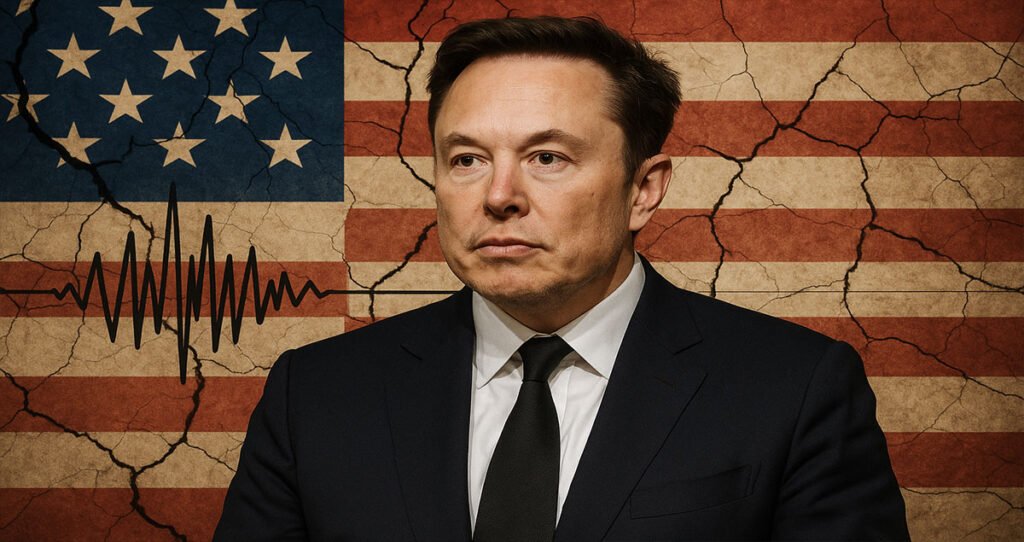The America Party, a new political party founded by Elon Musk, is a tectonic change in American politics that is likely to transform the whole business world. Unleashed on July 5, 2025, after he had an explosive falling out with President Trump and the so-called Big, Beautiful Bill, this political movement has a direct bearing on Musk and his $38 billion government-funded business empire that includes Tesla and SpaceX.
It says that the American Party had been rigorously limiting itself to gain control in just 2 or 3 Senate seats and 8 to 10 districts within the House, since the American Party is considered to be a target and not a mass political party. This strategic maneuver would transform the nature in which the tech billionaires would participate in the American style of politics, whilst preserving gargantuan contracts with government and regulatory benefits, and promoting contemporary innovation economies.
The Billionaire’s Political Earthquake: How Elon Musk’s New Political Party Emerged
The political scene has never been the same since the world’s richest man announced he had begun the American. The provocative turn of events is, by all means, much more than mere political gamesmanship; it portends a paradigm shift in the interaction between American business elitism and institutionalized authority.

The creation of the new political party by Elon Musk is an outcome of the tragic collapse of relations between him and President Donald Trump. It reached the brink when Musk announced that in case of passing of the insane spending bill, the next day, the America Party would be created, meaning Trump’s domestic policy bill. The cynical political gesture illustrates how today’s business people and entrepreneurs consider active political involvement as a required business approach and not a democratic option.
The time of such an announcement has much deeper implications for American relationships as far as their democracy and business relations are concerned. Musk announced the formation of the America Party Americana movement to restore your freedom instead of viewing his political project as party politics. As this message strategy shows, this is a keen recognition of a highly modern contempt by voters of the existing political structures.
| Key Timeline Events | Business Impact | Political Significance |
| July 5, 2025 – America Party Launch | Tesla stock volatility | Third-party legitimacy |
| May 2025 – Trump Administration Exit | $22B SpaceX contracts at risk | Political independence |
| 2024-2025 – Government Funding Analysis | $38B total federal funding | Regulatory relationship shift |
The Genesis of America’s Most Expensive Political Gamble
The catastrophic collapse of the Trump-Musk alliance represents one of the most expensive political divorces in American history. The personal hatred that has arisen between the old guard of the Republican establishment and the tech billionaire can be exemplified by an ugly one by former Trump strategist Steve Bannon, in which he referred to Musk as Elmo the Mook.
This political division developed based on a basic conflict over priorities of government spending as well as fiscal responsibility. The contentious bill would increase the national deficit by 3.3 trillion within a few years of 2025 and 2034, and that is precisely the kind of financial irresponsibility that Musk suggested compelled him to be politically independent. This opposition conceals more profound philosophical opposites regarding the task of government as opposed to limiting business creativity.
The stance taken by the American Party shows an intentional approach rather than an impulsive response. In the Democratic and Republican trend of maximum spending, Musk has referred to them as the uni party, which means that his political movement is geared towards change and not partisan inclinations. This tactical positioning lures disenfranchised voters who are fed up with the status quo in politics and view it as an outside hope that will reform the system as an outsider.
The economic consequences of such a political divorce are much wider than the interpersonal affairs. Musk’s business empire has received $38 billion in government funding through more than 400 federal contracts, nearly 90 federal and local grants, and numerous tax credits, making political stability essential for continued business success. This economic interdependence explains why Musk’s new party represents strategic business protection rather than purely ideological political engagement.
Deconstructing the $38 Billion Business Empire Protection Strategy
Understanding Elon Musk’s new political party requires analyzing the massive government funding that supports his business empire. SpaceX and Tesla had received federal contracts totalling at least $18 billion over the past decade, and SpaceX alone had acquired over $17 billion in contracts since 2015. This financial dependence creates compelling motivations for direct political engagement.

Tesla’s Regulatory Battlefield represents a critical front in Musk’s political strategy. The manufacturer of electric vehicles enjoys the federal tax credits of billions of dollars every year and has growing regulatory pressures from various governmental agencies. Tesla has managed to earn 11.4 billion regulatory credits, and this means that the profitability of corporations is a direct result of government policy. The American Party platform likely prioritizes maintaining these advantages while reducing regulatory burdens that constrain innovation.
SpaceX Government Contracts constitute the crown jewel of Musk’s political concerns. SpaceX contracts with the federal government amount to 22 billion dollars; of this total, 15 billion constitutes NASA only. These contracts are in national security, scientific research, and commercial activities in space, and therefore, political relationships are vital in business existence. According to defense analysts, it is hard to see how the government will cancel SpaceX contracts anytime soon, which indicates the strategic nature of such relationships.
| Business Division | Government Funding | Political Risk Level | Strategic Importance |
| SpaceX | $22 billion contracts | High | National security critical |
| Tesla | $11.4 billion credits | Medium | Market leadership |
| Neuralink | FDA approval pending | Very High | Innovation timeline |
| X Platform | Regulatory scrutiny | High | Communication control |
The integration of Musk’s America Party with his business interests creates unprecedented conflicts of interest that could reshape American politics. Musk’s companies will continue to hold 52 active federal contracts totaling an additional $11.8 billion, making political success directly connected to business outcomes. This financial interdependence explains why traditional political approaches prove insufficient for protecting modern tech empires.
America Party Platform: The Innovation Economy Manifesto
The American Party platform represents a comprehensive vision for transforming government-business relationships in the digital age. This political manifesto prioritizes technological innovation, regulatory efficiency, and market-driven solutions over traditional political approaches that constrain entrepreneurial freedom.
The Government Efficiency Revolution forms the cornerstone of Musk’s new party ideology. The platform supports transparency systems based on blockchain technology, which, theoretically, may transform how federal spending is monitored, besides eliminating bureaucratic inefficiencies that have led to the overloading of innovative businesses. The technological form of governance indicates an attitude in Silicon Valley that the software is ready to address traditional political issues in a better manner than approaching the problem through policies.
The Space Commerce Liberation focuses on the regulatory structures that already limit space commercialization. The America Party platform likely includes provisions for asteroid mining rights, Mars colonization legal structures, and commercial space station regulations that favor private enterprise over government-controlled space activities. These policies directly benefit SpaceX while positioning America as the global leader in space commerce.
Clean Energy Acceleration represents a sophisticated approach to environmental policy that avoids the regulatory burdens of traditional Green New Deal approaches. Musk’s America Party platform emphasizes nuclear power renaissance, carbon capture technology incentives, and grid modernization through private-public partnerships. This strategy supports Tesla’s market position while appealing to voters concerned about climate change without embracing economically destructive environmental regulations.
The platform’s emphasis on Free Speech Absolutism reflects Musk’s experience with content moderation controversies on the X platform. American party policies likely include Section 230 reforms that protect platform innovation while limiting government surveillance of tech companies. This regulatory approach creates competitive advantages for American tech companies while appealing to voters concerned about censorship and government overreach.
The Political Machinery: Building America’s First Tech Party
The founding of a new political party by Elon Musk demands the need to break huge structural obstacles that have posed a hindrance to the success of third-party movements in the past. Turning the American Party into a meaningful movement will be difficult, according to political analysts who understand the systemic challenges facing new political organizations.

Overcoming Major Hurdles represents the primary challenge for the American Party. Ballot access requirements in 50 states typically cost $50+ million, while Federal Election Commission compliance creates operational complexity that deters most political entrepreneurs. Musk’s new party benefits from unlimited funding capacity, but regulatory restrictions limit corporate influence in ways that constrain traditional business approaches to political problems.
The Silicon Valley Coalition represents the hidden strength behind Musk’s America Party. Tech executives privately support political alternatives while maintaining public caution about direct political engagement. Venture capital companies are becoming more political by offering interest to those candidates knowledgeable about the policy implications of the field of technology. Innovation workers, especially in high-growth industries, want to have political representation that serves their economic needs more than any conventional political base.
Digital Campaign Strategy revolutionizes political engagement through technological innovation. The American Party uses technologically advanced voter targeting via the social media algorithm, fundraising using cryptocurrency that avoids traditional donors, and virtual reality town hall meetings that can target audiences across the world. This technological style of conducting political campaigning confirms further issues of wariness regarding the innovation-based response to conventional political challenges.
The organizational format of the new party started by Musk differs from the traditional hierarchy of a political party but is closer to the start-up approach to organization. This includes rapid iteration on policy positions, data-driven decision-making, and performance metrics that prioritize results over political traditions. Such approaches could transform American political culture while protecting the business interests that motivated the party’s creation.
Market Impact Analysis: When Politics Meets Profit
The formation of Elon Musk’s new political party creates unprecedented market dynamics that blur traditional boundaries between political and business activities. Financial markets now must evaluate political risk alongside traditional business fundamentals when analyzing companies with significant government exposure.
Stock Market Volatility reflects investor uncertainty about the political implications of the American Party. Tesla stock fluctuations increasingly correlate with political announcements as investors attempt to price the political risk premium associated with Musk’s ventures. SpaceX’s valuation changes in private markets demonstrate how political positioning affects investor confidence in government-dependent business models.
The Government Contract Implications are the closest financial issue that Musk will be facing in his America Party. The investments SpaceX made on the politics front alone during the fiscal year 2024 (through hundreds of government contracts) equaled nearly $3.8 billion, thus making political ties a key to business sustainability. Federal procurement policies might be unjustly inclined or subject companies to a disadvantage because of political beliefs carried out by the founders of the company, thus adding new types of business risk that need political hedging.
Regulatory Environment Shifts create competitive advantages for companies aligned with the American Party platform. Unless the leadership in political organizations changes to be favorable to innovation, the timelines in the FDA explicitly with Neuralink may be far too long, but the environmental regulations impacting Tesla manufacturing may be adjusted to permit more domestic operations. There are opportunities to receive great competitive advantages in global markets through international trade policies that work in favor of American tech businesses.
The Competitive Landscape Evolution forces other tech billionaires to consider similar political strategies. Jeff Bezos of Amazon is also feeling the heat of regulations, whereas Alphabet, as Google, is under investigation for antitrust, which may be helped by representation in politics. The political positioning of Microsoft toward AI dominance reveals how tech companies are slowly becoming more where politics reign supreme in terms of basic business infrastructure than politics as a voluntary civic exercise.
| Market Sector | Political Risk Level | Potential Upside | Competitive Impact |
| Space Technology | Very High | Massive | SpaceX advantage |
| Electric Vehicles | High | Significant | Tesla leadership |
| AI/Neuralink | Extreme | Revolutionary | First-mover benefit |
| Social Media | High | Substantial | Platform control |
The Opposition Forces: Establishment Pushback and Resistance
Elon Musk’s new political party faces fierce opposition from established political interests who view the American Party as an existential threat to traditional power structures. This resistance spans both major political parties and reflects deeper concerns about billionaire influence in American democracy.

Republican Establishment Fury manifests most visibly through attacks like Steve Bannon’s “Elmo the Mook” characterization, which reveals personal animosity that extends beyond policy disagreements. Traditional GOP donors threaten funding withdrawal from candidates who align with Musk’s America Party, while conservative media questions his loyalty and motivations. The main issues that are directed against Musk-backed candidates are organized efforts to ensure that the American Party does not attract any political energies.
The Strategic Response of the Democratic Party shows the existence of differences within the party on how to respond to the new party by Musk. Progressive wings celebrate corporate political disruption as validation of their criticism of traditional Democratic establishment priorities. However, moderate Democrats fear voter defection to the American Party could cost them crucial elections. Fundraising implications for traditional Democratic donors create additional pressure to embrace or aggressively attack Musk’s political movement.
The Media War is a decisive battle for the political viability of the American Party. Distress over legacy media is met with enthusiasm over new media, which results in parallel information ecosystems that propagate the established rifts in politics. The allegations of social media manipulation and subsequent counter-accusations prove the point that online platforms are being used as a weapon in modern politics. Public relations strategies increasingly determine political viability in ways that traditional campaign approaches cannot address.
This resistance provides strategic openings to Musk to put the American Party he leads as the non-establishment force that crosses the political classifications. The American Party has the potential to satisfy frustrated voters by taking on assaults by Republican and Democratic establishments, and thus retaining the credibility of an outsider at the same time.
International Implications: Global Business Meets American Politics
Elon Musk’s new political party creates international complications beyond American domestic politics. Global business operations require political stability that the American Party formation potentially disrupts, while foreign governments must recalibrate their relationships with American political leadership.
The Chinese Government’s Response represents the most significant international challenge for Musk’s America Party. Tesla China operations remain vulnerable to political retaliation if Chinese leadership perceives the American Party as threatening their strategic interests. SpaceX technology transfers create national security concerns that complicate international business relationships. Battery supply chain dependencies affect political leverage in ways that traditional politicians never experienced.
European Union Regulatory Coordination requires careful diplomatic management as Musk’s new party develops its international profile. Digital Services Act enforcement could become politicized if European regulators view the American Party as threatening their regulatory sovereignty. Clean energy partnerships require political stability that third-party movements historically struggle to provide. Space cooperation agreements affect commercial opportunities in ways that purely domestic political calculations cannot address.
Emerging Markets Strategy demonstrates how the American Party must balance domestic political priorities with international business requirements. India manufacturing partnerships require political support that extends beyond American electoral cycles. Latin American Starlink deployments depend on a stable US foreign policy that third-party movements struggle to guarantee. African solar projects require consistent American policy frameworks that Musk’s America Party must demonstrate it can provide.
These international implications create strategic constraints that limit the American Party’s political flexibility while generating opportunities for diplomatic innovation that traditional politicians cannot provide.
The 2026 Midterm Strategy: Tactical Political Execution
It turns out that, despite being a new political party, Elon Musk is already prepared to balance his strategic priorities since the choice of the 2026 midterm elections to enter the US political arena will be his first real test, the focus on just 2 or 3 Senate seats and 8 to 10 House districts demonstrates a complex calculus of taking into account the specifics of American elections. This focused strategy concentrates on battles that can be won rather than the ones aimed at making political points.

Target District Analysis reveals where the American Party can realistically compete for electoral success. Tech-heavy constituencies in California, Texas, and Florida provide natural bases of support for candidates who understand innovation economy priorities. Suburban voters disillusioned with traditional parties represent swing demographics that Musk’s America Party can potentially capture. Young professional demographics favor innovation policies that the American Party platform emphasizes.
Candidate Recruitment represents a critical challenge for Musk’s new party. Tech executives transitioning to political leadership lack traditional campaign experience but understand policy implications that career politicians miss. Academic researchers seek policy implementation platforms that the American Party can provide. Military veterans with space and technology backgrounds offer credibility that purely civilian candidates cannot match.
Fundraising Revolution through cryptocurrency campaign finance models could revolutionize political fundraising. Bitcoin donations potentially bypass traditional PAC limitations while blockchain transparency addresses corruption concerns. International fundraising through digital asset networks creates opportunities and regulatory challenges that traditional campaigns never face.
A technique called Message Testing is the adoption of a data-driven Silicon Valley culture to political discourse. Sentiment analysis with the help of AI streamlines the political messages to help optimize them in real-time, with an A/B test of campaign strategies via social media platforms, offering direct feedback. Voter behavior and turnout optimization as a predictive modeling tool are technological superiorities that old-time political practices do not par with.
Risk Assessment: The Potential for Spectacular Failure
Elon Musk’s new political party faces substantial risks that could result in spectacular political and business failure. Historical precedents demonstrate how third-party movements typically collapse under structural pressures that the American Party must overcome to achieve lasting success.
Historical Third Party Disasters provide sobering lessons for Musk’s America Party. Ross Perot’s 1992 campaign achieved significant popular support but failed to translate enthusiasm into lasting political influence. Party movement integration versus independence strategies demonstrate how grassroots energy can be co-opted by established political interests. Libertarian Party limitations reveal structural weaknesses that the American Party must address to avoid similar failures.
The Ego Factor represents perhaps the greatest risk for Musk’s new party. Billionaire ambition often conflicts with political reality in ways that damage personal and business interests. Personal brand damage from political controversies could affect business operations across multiple industries. Family and personal life scrutiny impacts decision-making in ways that purely business-focused leaders never experience. Public backlash against perceived oligarchic control could undermine the American Party’s populist messaging.
Economic Downturn Scenarios create wildcards that could devastate Musk’s America Party. Market crashes affecting Musk’s wealth would limit political funding capacity just when electoral competition intensifies. The research studies have shown that economic anxiety generally changes the voter priorities by outweighing innovation in favor of economic security in the present. Business failures could undermine political credibility in ways that politicians avoid by maintaining a separation between personal and political interests.
These risks require sophisticated political risk management that extends beyond traditional business planning while maintaining the innovation focus that motivates the American Party’s creation.
Long-term Vision: Transforming American Democracy
The new political party initiated by Elon Musk symbolizes not just some maneuvers in the political game; it is a sort of complete vision of changing American democratic institutions to fit the needs of the 21st century. This longevity perception is what makes the American Party stand out against old third-party movements characterized by a single-issue approach or just election-oriented.

The 2028 Presidential Ambitions reveal Musk’s America Party’s ultimate political objectives. Constitutional eligibility questions surrounding foreign-born citizens create legal challenges the American Party must navigate. Campaign finance requirements for presidential runs demand organizational capacity that extends far beyond current party infrastructure. Electoral College strategies for third-party victory require political sophistication that startup methodology alone cannot provide.
Institutional Reform Agenda demonstrates how Musk’s new party envisions remaking American government structures. Term limits in Congress and the anti-corruption lobby are popular among the electorate, disillusioned by career politicians. Political patience is something usually missing in the repertoires of an entrepreneur, but it is essential when it comes to the Supreme Court reform based on constitutional amendments. Electoral system modernization through technology integration represents a natural territory for the American Party platform.
The Innovation State Vision articulates how the American Party would transform American governance to prioritize technological advancement. Acceleration of research and development will help companies such as SpaceX and Tesla, and contribute to the national interest by being sponsored by the government. Private partnership during the modernization of infrastructure is an indication of how Silicon Valley believes that the market mechanism can work better than the state bureaucracy can. Education system transformation for the 21st-century economy addresses workforce development needs that traditional politicians ignore.
This visionary approach positions Musk’s America Party as the political voice for Americans who believe technological innovation can solve problems that traditional politics cannot address.
Conclusion: The $38 Billion Political Experiment
The new political party of Elon Musk is a costly experiment in the history of American politics, the consequences of which go well beyond the sphere of politics-as-usual. Built on $38 billion in government funding, this political movement demonstrates how modern business empires require direct political engagement to protect their interests and advance their objectives.
Examples of Success Metrics to be used in place of the America Party are the number of seats held by the party in the 2026 mid-term elections, shifts in the number of policies which affect businesses in the innovation sector, and the rise in the number of companies held by Musk in terms of market value. These measurable outcomes will determine whether the American Party represents genuine political innovation or an expensive vanity project.
The Precedent Factor establishes templates for future billionaire political engagement. Musk’s America Party’s success or failure will influence how other tech leaders approach political involvement, while determining regulatory responses to concentrated wealth influence. The democratic consequences of business-political integration are not very clear but unquestionably carry extensive weight.
The Ultimate Verdict on the new political party by Elon Musk will be determined by whether structural impediments buttressing the failure of third-party successes in the past can be solved through technological activity. The probability assessments for political success remain uncertain, but the business risk-reward analysis suggests the American Party represents rational strategic investment rather than impulsive political gestures.
The long-term implications for the American political system extend beyond Musk’s interests to fundamental questions about democracy, capitalism, and innovation in the 21st century. The American Party may fail politically while succeeding in transforming how Americans think about the relationship between business success and political power.

